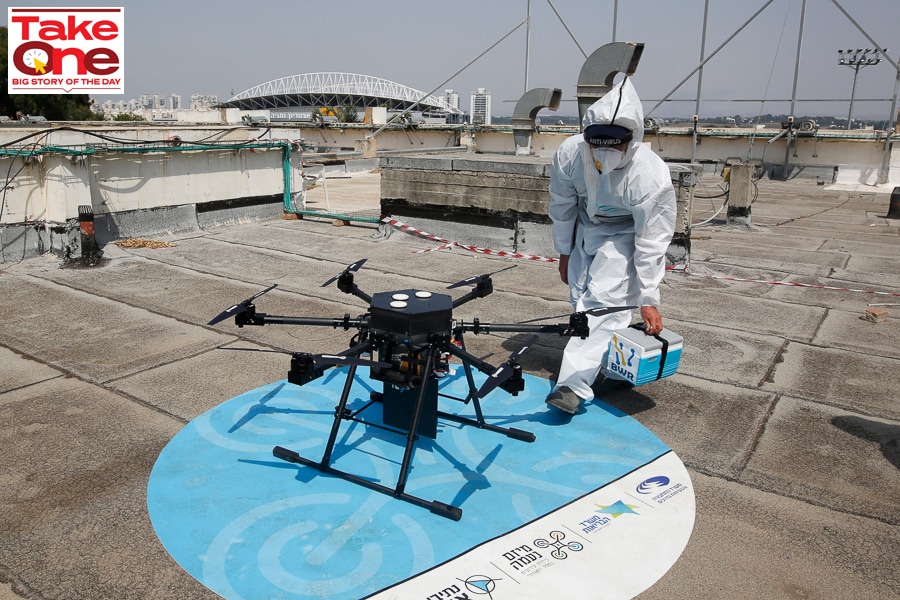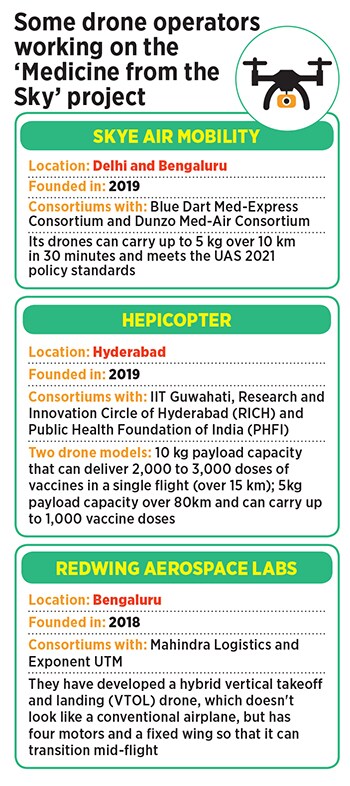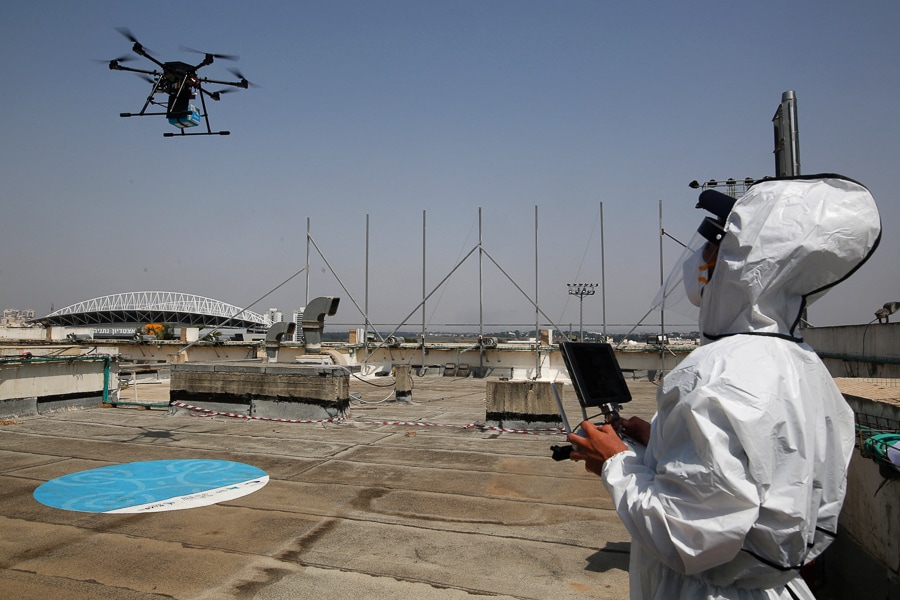
Vaccine delivery, the drone way
While the Centre has invited an expression of interest for unmanned aerial vehicles, a few state governments are also set to start trials with UAVs for supply of medical supplies and vaccines to remote areas
 A person wearing a protective suit collects a cooler from a drone, which usually carries blood samples to be tested for Covid-19, on July 28, 2020 outside DOROT, Netanya Geriatric Medical Center, in the central Israeli city of Netanya. Amid the novel coronavirus pandemic crisis, the Israeli Ministry of Transportation started a pilot project “Remedy from the sky” program, drones for delivery of payloads including medical items like blood samples and medicines; Images: GIL COHEN-MAGEN / AFP
A person wearing a protective suit collects a cooler from a drone, which usually carries blood samples to be tested for Covid-19, on July 28, 2020 outside DOROT, Netanya Geriatric Medical Center, in the central Israeli city of Netanya. Amid the novel coronavirus pandemic crisis, the Israeli Ministry of Transportation started a pilot project “Remedy from the sky” program, drones for delivery of payloads including medical items like blood samples and medicines; Images: GIL COHEN-MAGEN / AFP
Five years ago, in 2016, a nationwide drone delivery programme for medical supplies was launched in Rwanda. In March 2021, the world’s first drone delivery of Covid-19 vaccines took place in Ghana. Even as the global pandemic has only made discrepancies in the medical supply chain more evident, African countries, according to the World Economic Forum, are showing the rest of the world the social and economic value that can be provided by this technology.
Improving the medical supply chain, especially in rural areas, is necessary and countries like Rwanda, Ghana, the US and Israel are great case studies for how India can also start using drones. Rural India has been severely hit by the second wave of the pandemic and the need for medical supplies and vaccines is immense. A recent report by SBI Research pointed out that between March and May 2021, the percentage of rural districts with Covid-19 cases across India surged from 36.8 to 48.5.
Even as the global medical drones market size is expected to reach $947.6 million by 2027, expanding at a CAGR of 6.5 percent over the forecast period according to reports, India isn’t too far behind in using this technology—both central and some state governments are working on ways to improve medical supply chains in India via drones.
Drones delivering vaccines in India
On June 11, HLL Infra Tech Services Limited—a subsidiary of government-owned HLL Lifecare which is procuring all vaccines in the country for the government—invited an Expression of Interest (EoI) for delivery of vaccines and drugs by Unmanned Aerial Vehicles (UAVs) on behalf of the Indian Council of Medical Research (ICMR). According to the EoI, ICMR is looking for UAVs that can travel up to 35 km with supplies of 4 kg and fly at an altitude of at least 100 meters, “to reach inaccessible (hard to reach) areas to cover last-mile coverage at difficult terrain in selected locations”.




 The Ministry of Civil Aviation (MoCA) and Directorate General of Civil Aviation (DGCA) have granted conditional exemption to the government of Telangana for conducting experimental Beyond Visual Line of Sight (BVLOS) drone flights—which are otherwise not permissible—for delivery of vaccines. All the pilots will take place in an identified airspace in Vikarabad district.
The Ministry of Civil Aviation (MoCA) and Directorate General of Civil Aviation (DGCA) have granted conditional exemption to the government of Telangana for conducting experimental Beyond Visual Line of Sight (BVLOS) drone flights—which are otherwise not permissible—for delivery of vaccines. All the pilots will take place in an identified airspace in Vikarabad district.




